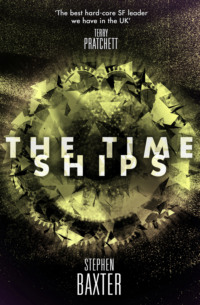
Полная версия
Origin
‘But even if you make it to the Moon, what will you find? You should know I’ve had several briefings in preparation for this meeting. One of them was with Dr Julia Corneille, from the Department of Anthropology at the American Museum of Natural History. An old college friend, as it happens.’
‘Anthropology?’
‘Actually Julia’s specialty is palaeoanthropology. Extinct homs, the lineage of human descent. You see the relevance.’
‘Homs?’
‘Hominids.’ Della smiled. ‘Sorry. Field slang. You can tell I spent some time with Julia … She told me something of her life, her work in the field. Mostly out in the desert heartlands of Kenya.’
‘Looking for fossils,’ Malenfant said.
‘Looking for fossils. People don’t leave many fossils, Malenfant. And they don’t just lie around. It took Julia years before she learned to pick them out, tiny specks against the soil. It’s a tough place to work, harsh, terribly dry, a place where all the bushes have thorns on them … Fascinating story.’ She picked up the scrap of bone from her desk. ‘This was the first significant find Julia made. She told me she was engaged on another dig. She was walking one day along the bed of a dried-out river, when she happened to glance down … Well. It is a fragment of skull. A trace of a woman, of a species called Homo erectus. The Erectus were an intermediate form of human. They arose perhaps two million years ago, and became extinct a quarter-million years ago. They had bodies close to modern humans, but smaller brains – perhaps twice the size of chimps’. But they were phenomenally successful. They migrated out of Africa and covered the Old World, reaching as far as Java.’
Malenfant said dryly, ‘Fascinating, ma’am. And the significance –’
‘The significance is that the homs who rained out of the sky, on the day you lost your wife, Malenfant, appear to have been Homo erectus. Or a very similar type.’
There was a brief silence.
‘But if Erectus died out two hundred and fifty thousand years ago, what is he doing falling out of the sky?’
‘That is what you must find out, Malenfant, if your mission is approved. Think of it. What if there is a link between the homs of the Wheel and ancestral Erectus? Well, how can that be? What does it tell us of human evolution?’ Della fingered her skull fragment longingly. ‘You know, we have spent billions seeking the aliens in the sky. But we were looking in the wrong place. The aliens aren’t separated from us by distance, but by time. Here –’ she said, holding out the bit of bone ‘– here is the alien, right here, calling to us from the past. But we have to infer everything about our ancestors from isolated bits of bone – the ancient homs’ appearance, gait, behaviour, social structure, language, culture, tool-making ability – everything we know, or we think we know about them. We can’t even tell how many species there were, let alone how they lived, how they felt. You, on the other hand, might be able to view them directly.’ She smiled. ‘Even ask them. Think what it would mean.’
Malenfant began to see the pattern of the meeting. In her odd mix of hard-nosed scepticism at his mission plans, and wide-eyed wonder at what he might find up there, Della was groping her way towards a decision. His best tactic was surely to play straight.
Nemoto had been listening coldly. She leaned forward. ‘Madam Vice-President. You want this Dr Corneille to have a seat on the mission.’
Ah, Malenfant thought. Now we cut to the horse-trading.
Della sat back in her rocker, hands settling over her belly. ‘Well, they sent geologists to the Moon on Apollo.’
‘One geologist,’ said Malenfant. ‘Only after years of infighting. And Jack Schmitt was trained up for the job; he made sure he was, in fact. As far as I know there are no palaeoanthropologists in the Astronaut Office.’
‘Would there be room for a passenger?’
Malenfant shook his head. ‘You’ve seen our schematics.’
Della tapped her desk, and brought up computer-graphic images of booster rockets and spaceplanes. ‘You are proposing to build a booster from Space Shuttle components.’
‘Our Saturn V replacement, yes.’
‘And you will glide down into the Red Moon’s atmosphere in a – what is it?’
‘An X-38. It is a lifting body, the crew evacuation vehicle used on the Space Station. We will fit it out to keep us alive for the three-day trip. On the surface we will rendezvous with a package of small jets and boosters for the return journey, sent up separately. The whole mission design is based around a two-person crew. Madam Vice-President, we just couldn’t cram in anybody else.’
‘Not on the way out,’ Della said evenly. ‘Two out, three back. Isn’t that your slogan, Malenfant?’
‘That’s the whole idea, ma’am. And those outbound two have to be astronauts. The best scientist in the world will be no use on the Red Moon dead.’
‘The same argument was used to keep scientists off Apollo,’ Della said.
‘But it is still valid.’
Nemoto said coldly, ‘The reality is that I must fly this mission because the Japanese funding depends on it. And Malenfant must fly the mission –’
‘Because the American public longs for him to go,’ Della sighed. ‘You’re right, of course. If this mission is approved, then it will be you two sorry jerks who fly it.’
If. Malenfant allowed himself a flicker of hope.
Nemoto seemed to be growing agitated. ‘Madam Vice-President, we must do this. If I may –’ She leaned forward and unrolled her softscreen on Della’s desktop.
Della watched her blankly. Malenfant had no idea where this was leading.
‘There is evidence that similar events have touched human history before, evidence buried deep in our history and myths. Consider the story of Ezekiel, from the Old Testament: And when the living creatures went, the wheels went by them: and when the living creatures were lifted up from the Earth, the wheels were lifted up. Or consider a tale from the ancient Persian Gulf, about an animal endowed with reason called Oannes, who used to converse with men but took no food … and he gave them an insight into letters and sciences and every kind of art –’
Shit, Malenfant thought.
Della was keeping her face straight. ‘So is this your justification for a billion-dollar space mission? UFOs from the Bible?’
Nemoto said, ‘My point is that the irruption of the Red Moon is the greatest event in modern human history. It will surely shape our future – as it has our past. The emergence of the primitive hominids from Malenfant’s portal tells us that. This one event is the pivot on which history turns.’
‘I feel I have enough on my plate without assuming responsibility for all human history.’
Nemoto subsided, angry, baffled.
Della said bluntly, ‘However I do need to know why you are trying to kill yourselves.’
Malenfant bridled. ‘The mission profile –’
‘– is a death-trap. Come on, Malenfant; I’ve studied space missions before.’
Malenfant sat up straight, Navy style. ‘We don’t have time not to buy the risks on this one, ma’am.’
‘You’re both obsessed enough to take those risks. That’s clear enough. Nemoto I think I understand.’
‘You do?’
Della smiled at Nemoto. ‘Forgive me, dear. Malenfant, she may be an enigma to you, but that’s because she’s young. She lost her family, her home. She wants revenge.’
Nemoto did not react to this.
‘But what about you, Malenfant?’
‘I lost my wife,’ he said angrily. ‘That’s motive enough. With respect, ma’am.’
She nodded. ‘But you are grounded. Let me put it bluntly, because others will ask the same question many times before you get to the launch pad. Are you going back to space to find your wife? Or are you using Emma as a lever to get back into space?’
Malenfant kept his face blank, his bearing upright. He wasn’t about to lose his temper with the Vice-President of the United States. ‘I guess Joe Bridges has been talking to you.’
She drummed her fingers on her desk. ‘Actually he is pushing you, Malenfant. He wants you to fly your mission.’ She observed his surprise. ‘You didn’t know that. You really don’t know much about people, do you, Malenfant?’
‘Ma’am, with respect, does it matter? If I fly to the Red Moon, whatever my motives, I’ll still serve your purposes.’ He eyed her. ‘Whatever they are.’
‘Good answer.’ She turned again to her softscreen. ‘I’m going to sleep on this. Whether or not you bring back your wife, I do need you to bring us some good news, Malenfant. Oh, one more thing. Julia’s ape-men falling from the sky … You should know there are a lot of people very angered at the interpretation that they might have anything to do with the origins of humankind.’
Malenfant grunted. ‘The crowd who think Darwin was an asshole.’
Della shrugged. ‘It’s the times, Malenfant. Today only forty per cent of American schools teach evolution. I’m already coming under a lot of pressure from the religious groups over your mission, both from Washington and beyond.’
‘Am I supposed to go to the Red Moon and convert the ape-men?’
She said sternly, ‘Watch your public pronouncements. You will go with God, or not at all.’ She fingered the bit of hominid skull on her desk. ‘O ye dry bones, hear the word of the Lord.’
‘Pardon?’
‘Our old friend Ezekiel. Chapter 37, verse 4. Good day.’
Emma Stoney:
There were bees that swarmed at sunset. Some of them stung, but you could brush them away, if you were careful. But there were other species which didn’t sting, but which gathered at the corner of the mouth, or the eyes, or at the edge of wet wounds, apparently feeding on the fluids of the body.
You couldn’t relax, not for a minute.
Uncounted days after her arrival, Emma woke to find an empty shelter.
She threw off her parachute silk and crawled out of the shelter’s rough opening. The sun was low, but it was strong, its warmth welcome on her face.
Sally’s hair was a tangled mess, her safari suit torn, bloody and filthy. Maxie clung to her leg. Sally was pointing towards the sun. ‘They’re leaving.’
The Runners were walking away. They moved in their usual disorganized way, scattered over the plain in little groups. They seemed to be empty-handed. They had abandoned everything, in fact: their shelters, their tools. Just up and walked away, off to the east. Why?
‘They left us,’ Maxie moaned.
A shadow passed over them, and Emma felt immediately cold. She glanced up at the deep sky. Cloud was driving over the sun.
A flake touched her cheek.
Something was falling out of the sky, drifting like very light snow. Maxie ran around, gurgling with delight. Emma held out her hand, letting a flake land there. It wasn’t cold: in fact, it wasn’t snow at all.
It was ash.
‘We have to go, don’t we?’ Sally asked reluctantly.
‘Yes, we have to go.’
‘But if we leave here, how will they find us?’
They? What they? The question seemed almost comical to Emma.
But she knew Sally took it very seriously. They had spent long hours draping Emma’s parachute silk over rocks and in the tops of trees, hoping its bright colour might attract attention from the air, or even from orbit. And they had laboured to pull pale-coloured rocks into a vast rectangular sigil. None of it had done a damn bit of good.
There was, though, a certain logic to staying close to where they had emerged from the wheel-shaped portal. After all, who was to say the portal wouldn’t reappear one day, as suddenly as it had disappeared, a magic door opening to take them home?
And beyond that, if they were to leave with the Runners – if they were to walk off in some unknown direction with these gangly, naked not-quite-humans – it would feel like giving up: a statement that they had thrown in their lot with the Runners, that they had accepted that this was their life now, a life of crude shelters and berries from the forest and, if they were lucky, scraps of half-chewed, red-raw meat: this was the way it would be for the rest of their lives.
But Emma didn’t see what the hell else they could do.
They compromised. They spent a half-hour gathering the largest, brightest rocks they could carry, and arranging them into a great arrow that pointed away from the Runners’ crude hearth, towards the east. Then they bundled up as much of their gear as they could carry in wads of parachute silk, and followed the Runners’ tracks.
Emma made sure they stayed clear of a low heap of bones she saw scattered a little way away. She was glad it had never occurred to Sally to ask hard questions about what had become of her husband’s body.
The days wore away.
Their track meandered around natural obstacles – a boggy marsh, a patch of dense forest, a treeless, arid expanse – but she could tell that their course remained roughly eastward, away from the looming volcanic cloud.
The Runners seemed to prefer grassy savannah with some scattered tree cover, and would divert to keep to such ground – and Emma admitted to herself that such park-like areas made her feel relatively comfortable too, more than either dense forest or unbroken plains. Maybe it was no coincidence that humans made parks that reminded them, on some deep level, of countryside like this. I guess we all carry a little Africa around with us, she thought.
She was no expert on botany, African or otherwise. It did seem to her there were a lot of fern-like trees and relatively few flowering plants, as if the flora here was more primitive than on Earth. A walk in the Jurassic, then.
As for the fauna, she glimpsed herds of antelope-like creatures: some of them were slim and agile, who would bolt as the Runners approached, but others were larger, clumsier, hairier, crossing the savannah in heavy-footed gangs. The animals kept their distance, and she was grateful for that. But again they didn’t strike her as being characteristically African: she saw no elephants, no zebra or giraffes. (But then, she told herself, there were barely any elephants left in Africa anyhow.)
It was clear there were predators everywhere. Once Emma heard the throaty, echoing roar of what had to be a lion. A couple of times she spotted cats slinking through brush at the fringe of forests: leopards, perhaps.
And once they came across a herd – no, a flock – of huge, vicious-looking carnivorous birds.
The flightless creatures moved in a tight group with an odd nervousness, pecking at the ground with those savagely curved beaks, and scratching at their feathers and cheeks with claws like scimitars. Their behaviour was very bird-like, but unnerving in creatures so huge.
The Runners took cover in a patch of forests for a full half-day, until the flock had passed.
The Runners called them ‘killing birds’. A wide-eyed Maxie called the birds ‘dinosaurs’.
And they did look like dinosaurs, Emma thought. Birds had evolved from dinosaurs, of course; here, maybe, following some ecological logic, birds had lost their flight, had forgotten how to sing, but they had rediscovered their power and their pomp, becoming lords of the landscape once more.
The Runners’ gait wasn’t quite human. Their rib cages seemed high and somewhat conical, more like a chimp’s than a human’s, and their hips were very narrow, so that each Runner was a delicately balanced slim form with long striding legs.
Emma wondered what problems those narrow hips caused during childbirth. The heads of the Runners weren’t that much smaller than her own. But there were no midwives here, and no epidurals either. Maybe the women helped each other.
Certainly each of them clearly knew her own children – unlike the men, who seemed to regard the children as small, irritating competitors.
The women even seemed to use sex to bond. Sometimes in the night, two women would lie together, touching and stroking, sharing gentle pleasures that would last much longer than the short, somewhat brutal physical encounters they had with the men.
By comparison, the men had no real community at all, just a brutish ladder of competition: they bickered and snapped amongst themselves, endlessly working out their pecking order. At that, Emma thought, this bunch of guys had a lot of common with every human mostly-male preserve she had ever come across, up to and including the NASA Astronaut Office.
Stone was the boss man; he used his fists and feet and teeth and hand-axes to keep the other men in their place, and to win access to the women. But he, and the other men, did not seek to injure or kill his own kind. It was all just a dominance game.
And Stone was not running a harem here. With all that fist-fighting he won himself more rolls in the hay than the other men, but the others got plenty too; all they had to do was wait until Stone was asleep, or looking the other way, or was off hunting, or just otherwise engaged. Emma had no idea why this should be so. Maybe you just couldn’t run a harem in a highly mobile group like this; maybe you needed a place to hold your female quasi-prisoners, a fortress to defend your ‘property’ from other men.
It was what these people lacked that struck Emma most strongly. They had no art, no music, no song. They didn’t even have language; their verbless jabber conveyed basic emotions anger, fear, demands but little information. They only ‘talked’ anyhow in social encounters, mating or grooming or fighting, never when they were working, making tools or hunting or even eating. She thought their ‘talk’ had more in common with the purring and yowling of cats than information-rich human conversation.
Certainly the Runners never discussed where they were going. It was clear, though, from the way they studied animal tracks, and fingered shrubs, and sniffed the wind, that they had a deep understanding of this land on which they lived, and knew how to find their way across it.
… Yes, but how did that knowledge get there, if not through talking, learning? Maybe a facility for tracking was hard-wired into their heads at birth, she speculated, as the ability to pick up language seemed to be born with human infants.
Whatever, it was a peculiar example of how the Runners could be as smart as any human in one domain – say, tracking – and yet be dumber than the smallest child in another – such as playing Maxie’s games of hide-and-seek and catch. It was as if their minds were chambered, some rooms fully stocked, some empty, all of the chambers walled off from each other.
When the Runners stopped for the night, they would scavenge for rocks and bits of wood and quickly make any tools they needed: hand-axes, spears. But they carried nothing with them except chunks of food. In the morning, when it was time to move on, they would just drop their hand-axes in the dirt and walk away, sometimes leaving the tools in the mounds of spill they had made during their creation.
Emma saw it made sense. It only took a quarter-hour or so to make a reasonable hand-axe, and the Runners were smart at finding the raw materials they needed; they presumably wouldn’t stop in a place that couldn’t provide them in that way. To invest fifteen minutes in making a new axe was a lot better than spending all day carrying a lethally sharp blade in your bare hands.
All this shaped their lifestyle, in a way she found oddly pleasing. The Runners had no possessions. If they wanted to move to some new place they just abandoned everything they had, like walking out of a house full of furniture leaving the doors unlocked. When they got to where they were going they would just make more of whatever they needed, and within half a day they were probably as well-equipped as they had been before the move. There must be a deep satisfaction in this way of life, never weighed down by possessions and souvenirs and memories. A clean self-sufficiency.
But Sally was dismissive. ‘Lions don’t own anything either. Elephants don’t. Chimps don’t. Emma, these ape-men are animals, even if they are built like basketball players. The notion of possessing anything that doesn’t go straight in their mouths has no more meaning to them than it would to my pet cat.’
Emma shook her head, troubled. The truth, she suspected, was deeper than that.
Anyhow, people or animals, the Runners walked, and walked, and walked. They were black shadows that glided over bright red ground, hooting and calling to each other, nude walking machines.
Soon Emma’s socks were a ragged bloody mess, and where her boots didn’t fit quite right they chafed at her skin. A major part of each new day was the foot ritual, as Emma and Sally lanced blisters and stuffed their battered boots with leaves and grass. And if she rolled up her trousers wet sores, pink on black, speckled her shins; Sally suffered similarly. They took turns carrying Maxie, but they were laden down with their parachute silk bundles, and a lot of the time he just had to walk as best he could, clinging to their hands, wailing protests.
During the long days of walking, Emma found herself inevitably spending more time than she liked with Sally.
Emma and Sally didn’t much like each other. That was the blunt truth.
There was no reason why they should; they had after all been scooped at random from out of the sky, and just thrown together. At times, hungry or thirsty or frightened or bewildered, they would take it out on each other, bitching and arguing. But that would always pass. They were both smart enough to recognize how much they needed each other.
Still, Emma found herself looking down on Sally somewhat. Riding on her husband’s high-flying career, Sally had gotten used to a grander style of life than Emma had ever enjoyed, or wanted. Emma had often berated herself for sacrificing her own aspirations to follow her husband’s star, but it seemed to her that Sally had given up a lot more than she had ever been prepared to.
For the sake of good relations, she tried to keep such thoughts buried.
And Emma had to concede Sally’s inner toughness. She had after all lost her husband, brutally slain before her eyes. Once she was through the shock of that dreadful arrival, Sally had shown herself to be a survivor, in this situation where a lot of people would surely have folded quickly.
Besides, she had achieved a lot of things Emma had never done. Not least raising kids. Maxie was as happy and healthy and sane as any kid his age Emma had ever encountered. And there turned out to be a girl, Sarah, twelve years old, left at home in Boston for the sake of her schooling while her parents enjoyed their extended African adventure.
Now, of course, this kid Sarah was left effectively orphaned. Sally told Emma that she knew that even if she didn’t make it home her sister would take care of the girl, and that her husband’s will and insurance cover would provide for the rest of her education and beyond. But it clearly broke her up to think that she couldn’t tell Sarah what had become of her family.
It seemed odd to Emma to talk of wills and grieving relatives as if they were corpses walking round up here on this unfamiliar Moon, too dumb to know they were dead but she supposed the same thing must be happening in her family. Her will would have handed over all her assets to Malenfant, who must be dealing with her mother and sister and family, and her employers would probably by now be recruiting to fill an Emma-shaped hole in their personnel roster.
But somehow she never imagined Malenfant grieving for her. She pictured him working flat-out on some scheme, hare-brained or otherwise, to figure out what had happened to her, to send her a message, even get her home.








